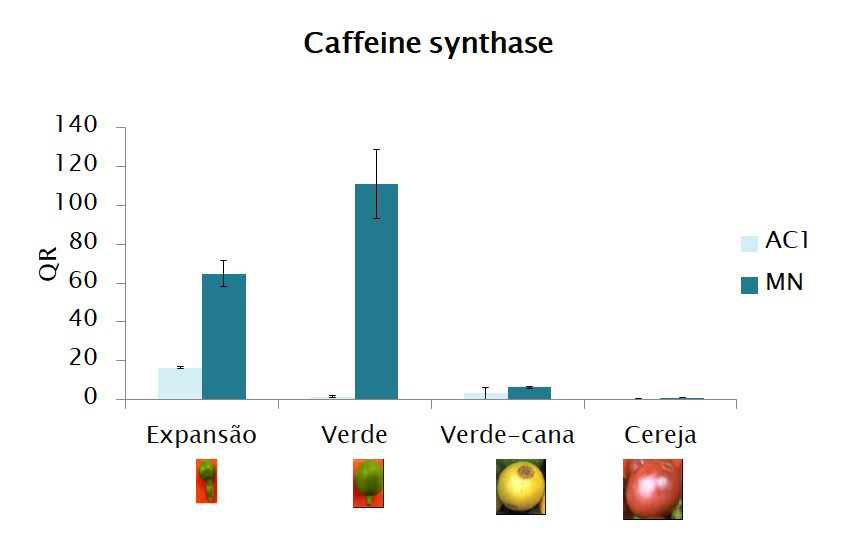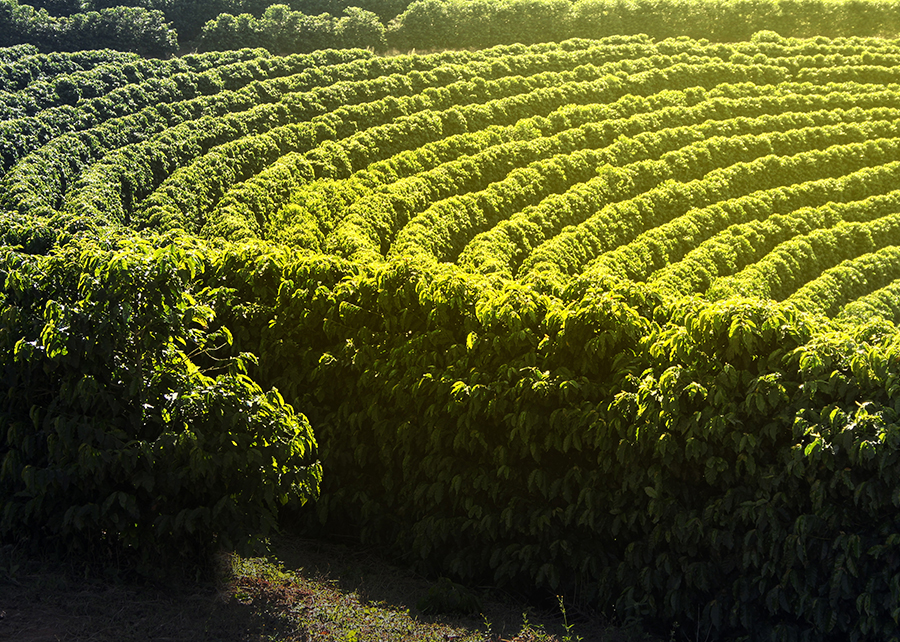Method to identify coffee trees with reduced caffeine content is patented
Method to identify coffee trees with reduced caffeine content is patented
Photo: Paulo Lanzetta

The decaffeinated coffee market is a niche that can grow. About 10% of the world's coffee consumers regularly have this type of the beverage.
|
A method to identify and select coffee plants (Coffea arabica) with reduced caffeine content has granted a patent from Brazil's National Institute of Intellectual Property (INPI). The inventors of the methodology are the researchers Mirian Perez Maluf, from Embrapa Coffee, and Maria Bernadete Silvarolla, from the Agronomic Institute (IAC) in Campinas, São Paulo.
“The method was an important advance for the development of naturally decaffeinated or low-caffeine Coffea arabica cultivars. The innovation will bring benefits to coffee farming, to coffee agroindustries and to consumers,” the Embrapa researcher asserts.
“This method was validated in the fields and we were able transmit the trait of low or absent caffeine content for several plant generations with different genetic origins”, celebrates Maluf, who performs her research at IAC through a partnership established in the scope of the Coffee Research Consortium. The Institute is under the wing of the São Paulo State Secretariat of Agriculture.
She underscores that the decaffeinated coffee market is a niche that can considerably grow as about 10% of the world's coffee consumers have the habit of drinking this type of beverage, while in Brazil this public is of only 1%. Currently, coffees are decaffeinated through industrial processes. These processes end up removing not only caffeine but also several other compounds from the beans that give coffee its sensory characteristics.
For Silvarolla, this innovation will enable the development of low-caffeine cultivars that can potentially become another option for cultivation by coffee growers in Brazil. “The differential of this chemical profile willl already be present in the seeds, with direct value aggregation for coffee farmers”, the IAC researcher sums up.
Silvarolla's work involved the identification of naturally decaffeinated mutants and the crossing of those materials with elite cultivars, which embody agronomic and industrial traits. “Once this stage was concluded, we made the selections in segregant generations with the aim of transferring the genes responsible for the mutants' low caffeine trait to elite cultivars, in order to combine low caffeine content with the high yield of the cultivars”, she explains. She underscores that all the crossings and further development of the hybrid plants are performed in the fields, a meticulous scientific work that started in 2005,” she reports.
“The hybrid plants and later generations were used in the molecular analyses in the laboratory in order to identify the differences between the materials with normal caffeine contents and those with reduced amounts, which originated the method that has just been patented”, the scientist comments.
History of the finding
A useful tool to understand the finding and its importance is a chronology of the studies to obtain a naturally caffeine-free cultivar of Coffea arabica, the most consumed coffee species in the world. In 1964, researchers from coffee producing countries, including Brazil, with funding from the Food and Agriculture Organization of the United Nations (FAO), collected seeds of 300 coffee plants in Ethiopia, the product's country of origin.
Once IAC's coffee breeding and genetic improvement program was created in 1987, wild coffee species with low caffeine content have been crossed with C. arabica varieties; however, uninteresting traits would be passed on to the resulting plants.
In 1996, a project was initiated with funds from the São Paulo State Research Support Foundation (Fapesp), the National Council of Scientific and Technological Development (CNPq) and the Coffee Research Consortium, and coordinated by Embrapa Coffee. The project analyzed about 3,000 coffee plants from IAC's gene bank, which in 2003 resulted in the discovery of three plants in one family that were naturally decaffeinated. The discovery was made by the geneticist Bernadete Silvarolla, jointly with the researcher Luiz Carlos Fazuoli, also from IAC, and Paulo Mazzafera, from the State University of Campinas (Unicamp). The plants were baptized AC1, AC2 and AC3 in honor of the late coffee geneticist Alcides Carvalho.
Such discovery was the basis for several studies with those plants. In 2005, with funding from the Coffee Research Consortium and from Study and Project Financing Agency (Finep), the researcher Mirian Maluf started molecular analyses of the gene that codifies caffeine synthase (cs), one of the enzymes involved in caffeine synthesis, present in the naturally decaffeinated coffee tree AC1. The analyses identified several changes called single nucleotide polymorphisms (SNPs) against the gene sequence isolated from coffee trees with normal caffeine content.

Hence it was possible to identify and mark the cs gene, and also understand the mutations associated with the absence of caffeine. Based on such finding, the idea is to replicate the same mutation in cultivated high-yield coffee plantations. This is possible with assisted breeding programs or through gene editing.
Rose Lane César (MTb 2978/DF)
Embrapa Coffee
Press inquiries
rose.cesar@embrapa.br
Phone number: +55 61 34481551
Carla Gomes (MTb 28.156/SP)
Agronomic Institute - IAC
Press inquiries
Phone number: +55 19 2137-0613
Translation: Mariana Medeiros (13044/DF)
General Secretariat
Further information on the topic
Citizen Attention Service (SAC)
www.embrapa.br/contact-us/sac/

